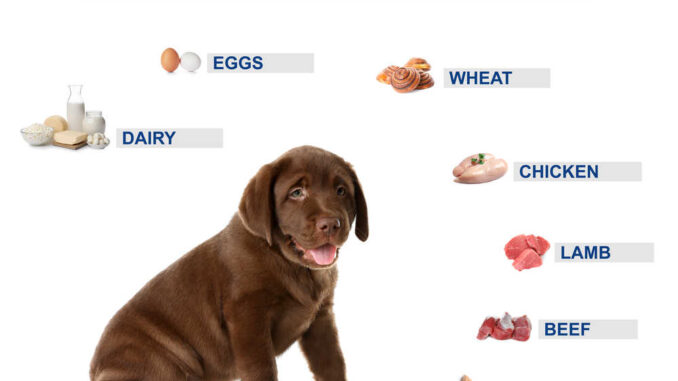
This article was updated on October 12th, 2023
Just like we need to keep ourselves healthy with a good diet, dogs need healthy diets to live long and happy lives. It’s hard to know what kind of food to give your dog and there are so many choices! And this can be complicated by the possibility of allergies.
What are food allergies for dogs?

Surprisingly, dogs can be allergic to their food, just like us. Allergies are a reaction of our immune system because it thinks that something is going to hurt us. The immune systems generally react to something is not considered “harmful” to most people, such as the ingredients in food. One of the most common food allergies in humans is peanuts. There are a few types of allergies in dogs. The most common are:
- skin allergies,
- food allergies, and
- environmental allergies.
10% of dog allergy cases are food allergies. While these pose different challenges, thankfully there are things we can do to help.
What’s the difference between allergies and intolerances?
A food allergy is when the immune system reacts to harmless food. A small amount of food can trigger symptoms, which can range from annoying to life-threatening.
Food intolerance is when the body has a chemical reaction to eating food or drinks. These often only include the digestive system and tends to be associated with less serious symptoms. Those with a food intolerance could be able to eat a small amount without trouble. Food intolerance is usually caused by the lack of an absence of an enzyme to fully digest a food (like lactose), irritable bowel syndrome, or sensitivity to food additives.
What ingredients in food can my dog be allergic to?
The most common allergens are proteins, eggs, soy, and wheat gluten.
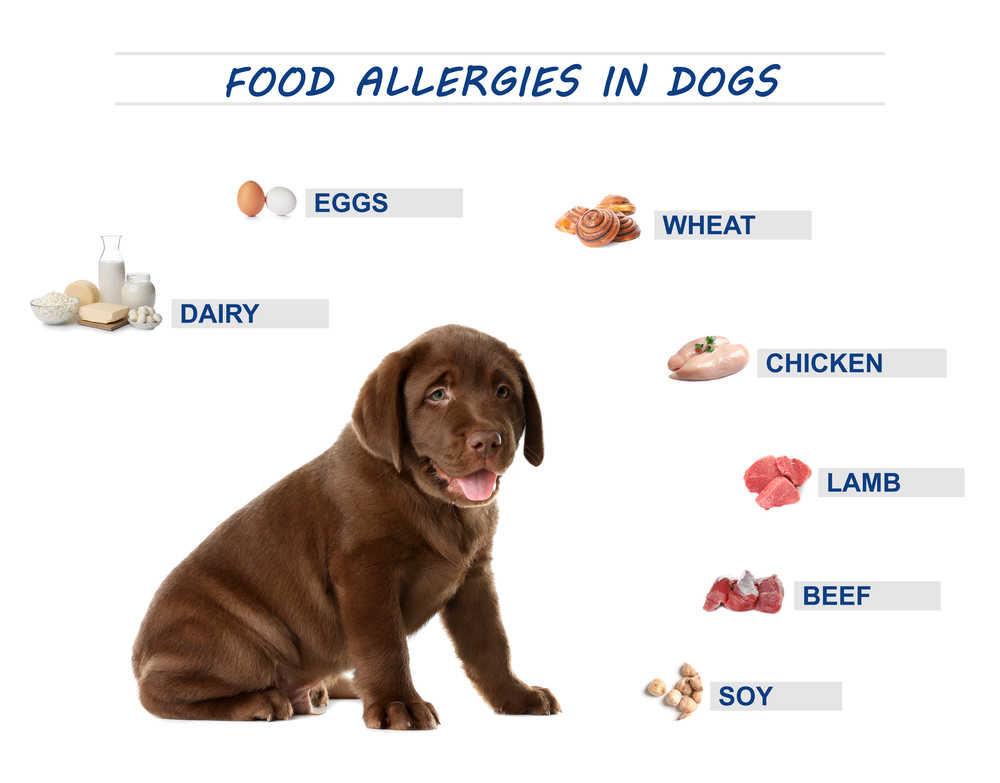
You may be thinking that dogs are carnivores – how can they be allergic to protein? Actually, dogs can be allergic to dairy, beef, and chicken.
Additionally, soy, eggs, and wheat gluten are common “filler” ingredients in dog foods.
Food allergies can be developed when an animal is exposed to the same thing over and over. Since beef and chicken are food ingredients, your dog may be eating them every day, which increases the chances of an allergy.
An egg allergy can be present due to an overreaction to the proteins in the egg yolk.
While these are the most common, almost any ingredient can produce a reaction.
What are the symptoms of dog food allergies?
It can be scary to consider whether your dog has an allergy or not. Thankfully, there are some obvious signs:
- Itchy skin, paws, or ears
- Skin issues including red, inflamed skin or rashes, hair loss
- Vomiting
- Diarrhea
However, there can be more subtle symptoms such as:
- Hyperactivity
- Weight loss
- Lethargy
- Aggression
If you notice any of these signs, especially in concert, it’s advised to schedule an appointment with your veterinarian.
How long does it take for symptoms to appear?
Unfortunately, it’s hard to determine when symptoms are going to appear. This makes it difficult to know whether these symptoms are linked to an allergy or something else.
Like humans, severe cases are usually known immediately. Dogs can break out in hives, or their throats can swell after ingestion of an allergen.
More commonly, it can take minutes or hours for an allergen to work its way through your dog’s system. Your immune response takes time to build up, producing these symptoms.
However, it can be up to 14 days before your dog presents symptoms.
The degree of reaction usually depends on the severity of the allergy.
Is my dog suffering?
If there is an immediate reaction, your dog may have some trouble breathing if their throats swell or they break out in hives. This is an emergency requiring immediate intervention.
Your dog’s more tempered symptoms can usually wait until a normal vet appointment, but it’s not pleasant to have your immune system attacking you.
But thankfully, there are ways we can help.
3 steps you can take at home to help
It is always best to take your pet to the veterinarian if you are concerned, but while you’re waiting, there are a few things you can do to help.
- Novel Protein: This is a term for any protein your pet has never eaten. The most common proteins in dog food are beef, chicken, turkey, and lamb. Since it’s hard to determine whether these are causing the allergies, you can switch to another food with a different main protein. Dogs allergies can consume venison and potato, duck and pea, salmon, kangaroo, or even crickets.
- Rotational Diet: In a rotational diet, you rotate your dog’s food (protein and type) rather than keeping it on the same thing forever. Since repetition can increase the risk of allergies, this is a good method for preventing and increasing allergies. It’s recommended to change food about every three months to maintain variety. However, be warned it may cause intestinal issues at first due to sensitive stomachs.
- Elimination Diet: This is a longer-term method to narrow down what foods are safe for pets to eat. Humans do this too for food allergies. You take your pet off all foods they’re eating and give them a strict diet of two foods they’ve never had. As times goes on, you introduce other foods. If it shows a reaction, you take the food back out and start again. Elimination diets should be a minimum of eight weeks, but longer is preferable.
How will the vet determine if my dog has allergies?
Discovering whether food allergies are causing symptoms in your dog is a process. Food allergies are a diagnosis of exclusion, which means your vet must rule out other possible causes first.
The first thing your vet will do is take a full history and conduct a general exam. Since skin irritation and itching are the most common symptoms, your vet will try to rule out other causes. To rule out mange, ringworm, infections, and environmental allergies, your veterinarian will conduct blood work and possible skin cultures for fungus or bacteria.
Unfortunately, there isn’t a direct test to know whether your dog has food allergies. But excluding other issues helps you and your pet get a little closer to an answer.
Food trials
To diagnose a food allergy, your veterinarian will have you feed either a limited ingredient, hydrolyzed, or a novel protein diet to your dog for at least eight weeks. This is called a food trial.
It is essential not to feed your dog anything else during this trial, including treats and flavored medications. It may take the entire eight weeks to notice a difference, so do not stop early.
If/once an ingredient is pinpointed that a dog is allergic to, typically a protein source in the food, it is important to find a new diet that doesn’t contain that ingredient and stick to it to prevent further flare-ups.
What is the treatment for dog food allergies?
Similar to the above, your vet will probably start a food trial, where they will eat a prescription diet and nothing else to see if symptoms resolve. If that doesn’t work, some will suggest going back to the older food to see if symptoms come back.
The only effective way to treat allergies is to change the diet. Vets will suggest at-home choices such as a rotational or novel protein diet. Additionally, some vets will offer a hydrolyzed protein prescription diet, which breaks down proteins so the body doesn’t recognize them as a threat.
To treat the symptoms, your vet may prescribe oral or topical medications to help relieve itching. Secondary issues such as ear infections will be addressed.
Cost
Unfortunately, it can be expensive to change your pet’s food or use prescription food. Additionally, the vet’s tests are expensive.
A skin test to check for possible allergens is usually about $200. The blood tests your vet may run can vary between $200-$300. An elimination diet can be expensive and time-consuming to isolate issues.
Hypoallergenic dog food ranges between $15-$55 for canned and $30-$130 for dry.
Prognosis
It’s hard to determine whether dog food allergies contribute to a decreased lifespan in dogs. Many factors including breed and overall health contribute to this. Some studies suggest a raw diet increases the general lifespan of dogs. Ensure you are following your vet’s advice for best results.
What is the best food for a dog with allergies?

There are hundreds of dog food brands out there, with even more combinations of ingredients. Foods offer different proteins and other ingredients. The best food for your dog will depend on their personal allergies and other health issues. Often, your vet will recommend a particular brand or prescription.
However, it’s important to ensure food have non-irritating ingredients for sensitive stomachs and health-supporting supplements. These will help ensure the continued health and wellness of your pet.
Dogs can get allergies through genetics. Like humans, allergies can be passed down through parents. However, it can lie dormant for many years before it’s triggered. An overactive immune system tends to overreact to many things. As such, dogs who have allergies are usually allergic to more than one thing.
Additionally, research studies haven’t been able to narrow down all causes of allergies. But some young animals treated with antibiotics could be predisposed to problems later because they change the bacteria inside the gut.
FAQ
Are certain breeds more likely to be affected?
Some breeds are more likely to have food allergies than others. The ones most commonly associated are dachshunds, bulldogs, golden retrievers, German shepherds, and pugs.
What if my dog is showing symptoms with one specific food brand?
If your dog is showing symptoms with one specific food brand, they may be reacting to a unique ingredient. The best method here would be to switch them to something else, especially if you suspect it’s a protein.
Can dog food allergies cause ear infections?
Dogs suffering from allergies are predisposed to ear infections. The allergies themselves don’t cause the ear infection, but an overactive immune system can contribute to other issues.
Can dog food allergies cause hair loss?
The itching and irritation from food allergies can contribute to hair loss if your dog chews or scratches at the areas.
Are dog food allergy tests accurate?
There are many websites and companies offering dog allergy tests, which are supposed to narrow down what your dog is allergic to. These are often not accurate, which contributes to the feeling of falsity. It’s best to follow an elimination or rotation diet rather than using online tests.
Related posts:
Disclaimer: This website's content is not a substitute for veterinary care. Always consult with your veterinarian for healthcare decisions. Read More.



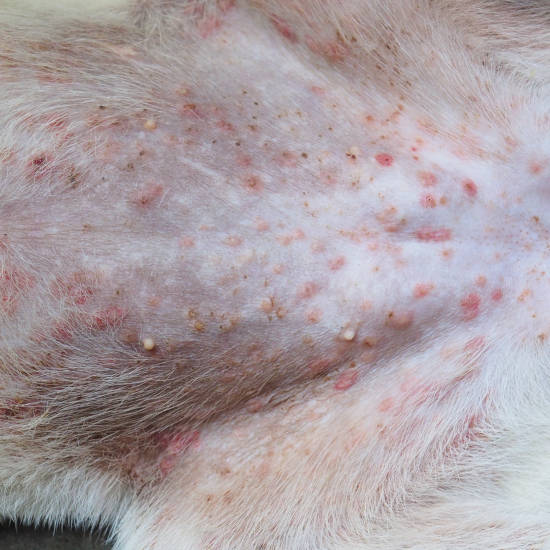
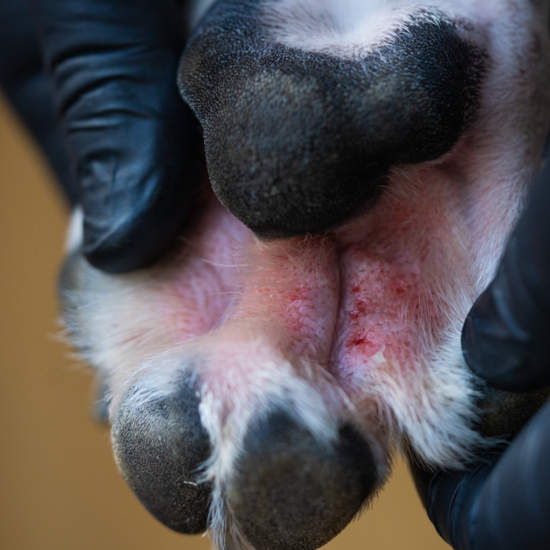
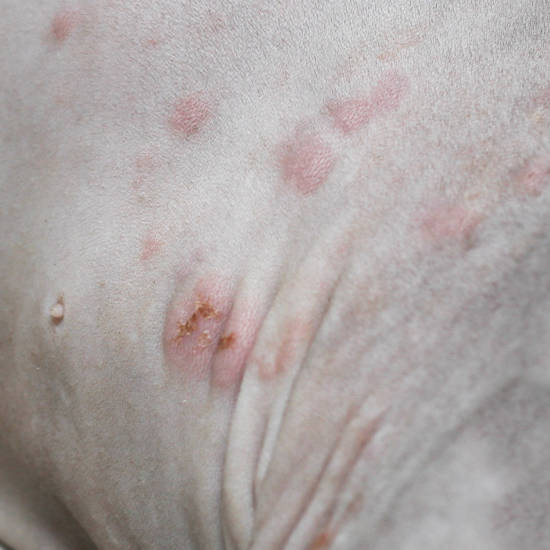






Be the first to comment